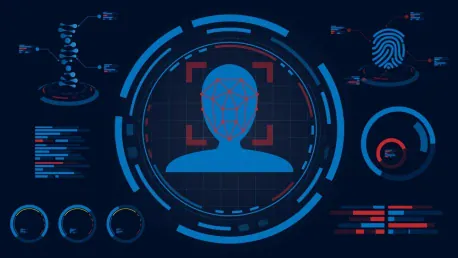Artificial Intelligence (AI) is transforming numerous facets of modern life, including public safety measures in the United Kingdom. AI-powered facial recognition technology (FRT) has emerged as a key element in this transformation, offering new capabilities for law enforcement and public safety. Yet, despite its considerable potential, this technology has sparked a myriad of controversies, particularly surrounding the balance between enhancing public safety and safeguarding civil liberties. This debate was brought to the forefront on September 5, 2024, when the UK became a signatory to The Council of Europe’s Framework Convention on Artificial Intelligence and Human Rights, Democracy, and the Rule of Law. This commitment was intended to mitigate potential abuses of AI technology, ensuring better protection for public data and human rights. However, not long after this promising move, Prime Minister Keir Starmer announced an expansion of FRT usage across police forces to tackle violent disorders, raising eyebrows and igniting heated debates among both policymakers and the public.
Government Commitment and Legislative Gaps
Prime Minister Keir Starmer has been vocal about his administration’s determination to leverage AI technologies to improve public safety in response to recent civil unrest. The acceleration of facial recognition system deployment by police forces forms part of a broader strategy aimed at modernizing law enforcement tools. However, despite these ambitious plans, there are glaring gaps in the legislative framework governing AI technologies in the UK. The current approach relies heavily on a principles-based framework, with existing regulators like Ofcom and the Information Commissioner’s Office (ICO) overseeing AI’s development within their respective domains. The Labour government has promised to eventually introduce binding legislation to manage powerful AI models. Nevertheless, at present, there is no central regulatory body, resulting in a fragmented and inconsistent web of laws addressing biometric data use.
Human rights organizations such as Liberty have consistently warned about the potential for the UK to become “the most intrusive mass surveillance regime of any democratic country.” These fears are not unfounded, particularly given the burgeoning use of predictive policing algorithms which have shown substantial risks to civil liberties, especially for marginalized communities. The lack of comprehensive oversight and robust legislation amplifies these concerns. The risks posed by a decentralized regulatory framework are profound, leaving ample room for arbitrary and potentially discriminatory applications of FRT without sufficient checks and balances.
Risks and Bias in Facial Recognition Technology
While facial recognition technology brings potential advantages for enhancing public safety, it also comes with significant risks and well-documented biases. A report by the National Physical Laboratory underscored that facial recognition systems tend to disproportionately identify black individuals as positive matches compared to their white or Asian counterparts. This “statistically significant” disparity has intensified criticism and fueled the ongoing discourse around AI-enabled surveillance.
Civil society organizations, including the #SafetyNotSurveillance coalition, have been vigorous in their campaigns against the unbridled use of predictive policing systems. They argue for legislative frameworks embedded in transparency, accountability, and accessibility to ensure that the deployment of such technologies does not encroach on civil liberties. Despite their efforts, the lack of robust oversight and explicit legal mandates for the police use of FRT remains a highly contentious issue.
The inherent biases within AI systems and facial recognition technology pose serious risks to privacy and equity. Misidentifications can lead to unjust profiling and wrongful arrests, exacerbating existing social and racial tensions. Consequently, the ethical considerations surrounding the use of powerful surveillance tools continue to fuel opposition from various advocacy groups. The debate highlights a significant tension between the potential benefits of FRT for public safety and the imperative to uphold human rights and equitable treatment under the law.
Public Sentiment and Private Sector Involvement
The British public has expressed notable caution regarding biometric surveillance. Research conducted by the Alan Turing Institute indicates that more than half of the population is uneasy about the sharing of biometric data between police forces and private entities. This sentiment extends beyond academic discourse, impacting real-world policy and regulatory responses. For instance, the House of Lords Justice and Home Affairs Committee has been exploring initiatives like the Pegasus Initiative, which collaborates between businesses and police to track and prosecute shoplifters using FRT. This inquiry underscores the complexities and scrutiny involved in integrating facial recognition technology into everyday policing activities.
Real-world instances of biometric data misuse have drawn significant regulatory backlash. In one notable example, the ICO ordered Serco to halt its use of facial recognition and fingerprint scanning for monitoring staff attendance, citing unlawful processing of biometric data. These regulatory actions illuminate the considerable gap between policy intentions and actual practice, highlighting the challenges faced by oversight bodies in keeping pace with rapid technological advancements.
Calls for Stronger Oversight and Legislation
Artificial Intelligence (AI) is revolutionizing many aspects of modern life, including public safety in the United Kingdom. One significant development is AI-powered facial recognition technology (FRT), now an important tool for law enforcement. While FRT promises enhanced public safety, it has also generated significant controversy, especially concerning the balance between improving safety and protecting civil liberties. This debate intensified on September 5, 2024, when the UK signed The Council of Europe’s Framework Convention on Artificial Intelligence and Human Rights, Democracy, and the Rule of Law. This agreement aims to prevent the misuse of AI technology and ensure the protection of public data and human rights. However, shortly after this hopeful development, Prime Minister Keir Starmer announced an expansion of FRT usage by police forces to combat violent unrest. This move raised eyebrows and led to intense debates among policymakers and the public, reflecting the ongoing tension between leveraging AI for public safety and protecting civil liberties.









